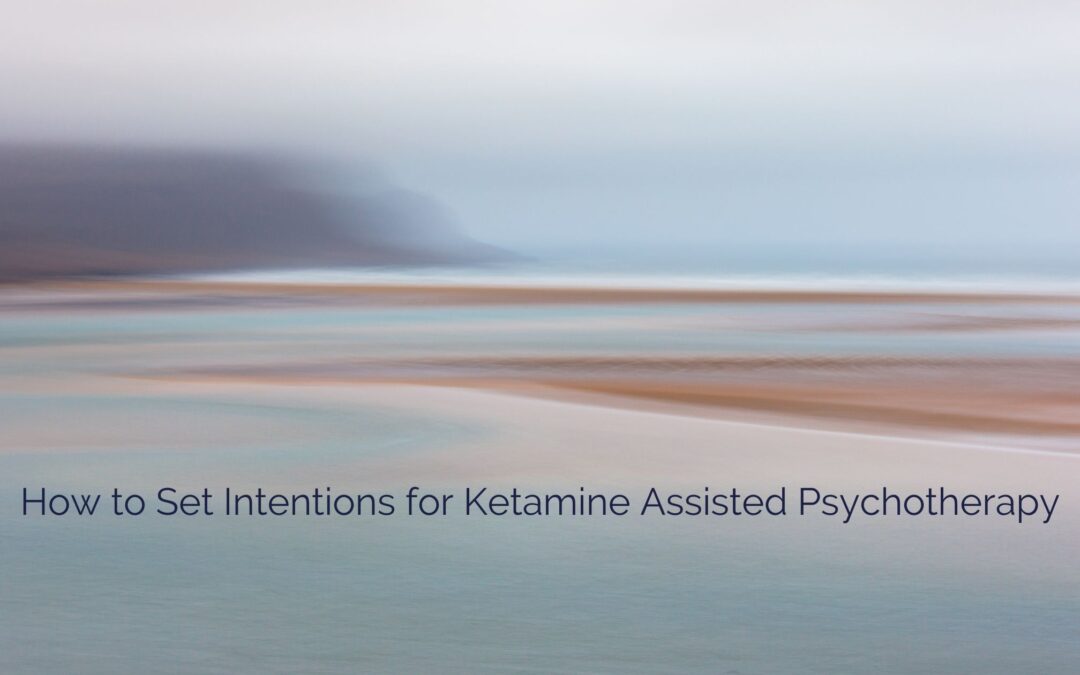One of the core elements of Ketamine Assisted Psychotherapy (KAP) is to set an intention for your ketamine experiences thoughtfully. This broadly refers to deciding what personal growth, insight, or healing you want to pursue as you take the medicine. Some examples of intentions could involve wishing to heal from past trauma, wanting to overcome debilitating depression or anxiety, recovering from professional burnout, or facilitating a deeper connection with personal spirituality. Your intention will help set the stage for the work you will do and may even evolve throughout your KAP treatment. It is important to understand how your intention will impact your ketamine journeys and how to get the most value from the growth you experience over treatment. Below are some ways of thinking about setting intentions, holding them during ketamine experiences, and integrating the insights you gain throughout your journey.
Mindfully develop your intention, and request guidance from your KAP therapist when needed.
 It is crucial to take time and space to carefully consider your intention for your KAP experiences. These intentions frame your growth trajectory and will impact the material that comes up during the course of There are many ways to reflect on as well as select the right intention for where you are at in your life. You might find it helpful to journal, meditate, or even discuss your ideas for intentions with a trusted support person. Your KAP therapist is a great resource here, as they can help ask questions or give opinions that hone your focus. Your intention should be personal and customized toward your needs and goals. Intentions don’t have to be incredibly specific, and you have a great deal of flexibility in terms of the s you might go. Some exploratory questions you might ask yourself could be: “What am I holding in my life that I wish I could release,” or “What area of my life causes the most disruption, and what would I internally need to get through this,” or “Where am I stuck and where do I desire to be?” These questions can help clarify what aspects of growth feel most important and guide you toward an intention that feels relevant and meaningful. When going into your ketamine experiences, it might be helpful to take a few moments to breathe, repeat the intention to yourself, and invite yourself to be open to what comes up in the session around the intention.
It is crucial to take time and space to carefully consider your intention for your KAP experiences. These intentions frame your growth trajectory and will impact the material that comes up during the course of There are many ways to reflect on as well as select the right intention for where you are at in your life. You might find it helpful to journal, meditate, or even discuss your ideas for intentions with a trusted support person. Your KAP therapist is a great resource here, as they can help ask questions or give opinions that hone your focus. Your intention should be personal and customized toward your needs and goals. Intentions don’t have to be incredibly specific, and you have a great deal of flexibility in terms of the s you might go. Some exploratory questions you might ask yourself could be: “What am I holding in my life that I wish I could release,” or “What area of my life causes the most disruption, and what would I internally need to get through this,” or “Where am I stuck and where do I desire to be?” These questions can help clarify what aspects of growth feel most important and guide you toward an intention that feels relevant and meaningful. When going into your ketamine experiences, it might be helpful to take a few moments to breathe, repeat the intention to yourself, and invite yourself to be open to what comes up in the session around the intention.
Hold your intentions loosely during the course of your sessions.
Even as you set an intention for KAP experiences, it is deeply important to remain open to the experience that actually occurs rather than focusing narrowly on the experience you intended to have. Said another way, it is important to hold your intentions loosely so that you strike a balance between having purpose to the session as well as openness to the course your growth takes. Let’s consider one example of how holding your intention loosely might look. Perhaps your intention for your KAP experience is to be a more emotionally available partner in your intimate relationship. Holding this loosely means knowing that your goal is to become emotionally available but remaining open even when the experience seems to have no obvious connection to your intention. As the KAP experience unfolds, you might find that the major themes are around your childhood and memories of traumatic relationships, which might not seem to relate directly to your current intimate relationship. However, when you look closer, there are actually numerous ways that your early relationships might shape how emotionally available you might be in adulthood. If there is trauma there, perhaps the KAP experience reveals that this early trauma needs to be resolved in order to become more emotionally available in intimate relationships. If you were gripping too tightly to your intention of being available in your current relationship, you might fight your experience in the KAP session, which could limit your engagement with a potentially core element of your growth process. Consider the metaphor of holding water in your hands. If you grip the water too tightly, it spills over your fingers, but when you hold water loosely in your cupped hands, you find that you can hold it all as long as you want without losing any.
Be open to the evolution of your intention.
 You might find that your intention evolves over the course of your ketamine experiences. As you set an intention for each ketamine experience, you are likely to find that your intention will shift and change based on what you’ve discovered in previous sessions. Each session will reveal something new, and it is important to remain open to the ways in which this could shape our intentions for future sessions. You might come into your initial ketamine experiences with the intention of overcoming lifelong depression. However, as your ketamine experiences unfold, you might find that your intentions evolve beyond resolving depression and move toward finding deeper connections with others, finding peace in the “here and now,” or learning to love the person you are. Each of these is certainly related to the initial intention of reducing depression but are more honed, nuanced elements/stages of that process. If you remain open to evolving your intention based on how you are growing from your ketamine experiences, you are likely to find your overall experience to be highly rewarding. If you are having trouble identifying how your ketamine experience relates to your intention, you can rely on your KAP therapist to help you unpack the complexities you are encountering.
You might find that your intention evolves over the course of your ketamine experiences. As you set an intention for each ketamine experience, you are likely to find that your intention will shift and change based on what you’ve discovered in previous sessions. Each session will reveal something new, and it is important to remain open to the ways in which this could shape our intentions for future sessions. You might come into your initial ketamine experiences with the intention of overcoming lifelong depression. However, as your ketamine experiences unfold, you might find that your intentions evolve beyond resolving depression and move toward finding deeper connections with others, finding peace in the “here and now,” or learning to love the person you are. Each of these is certainly related to the initial intention of reducing depression but are more honed, nuanced elements/stages of that process. If you remain open to evolving your intention based on how you are growing from your ketamine experiences, you are likely to find your overall experience to be highly rewarding. If you are having trouble identifying how your ketamine experience relates to your intention, you can rely on your KAP therapist to help you unpack the complexities you are encountering.
Setting intentions are a crucial aspect of getting the most out of KAP or any type of psychedelic-assisted psychotherapy. They provide anchoring purpose to your psychedelic experiences as well as frame the material that comes up during your experiences. Thoughtfully setting intentions can help give a much deeper healing experience, and it is important to hold these intentions in a way that allows us to be open to the growth that KAP experiences invite. Psychedelic medicine can be a powerful agent of change when used responsibly and with clear healing intentions that evolve with you during the course of your journey.
Photo credits:
Photo by Iulia Mihailov on Unsplash




